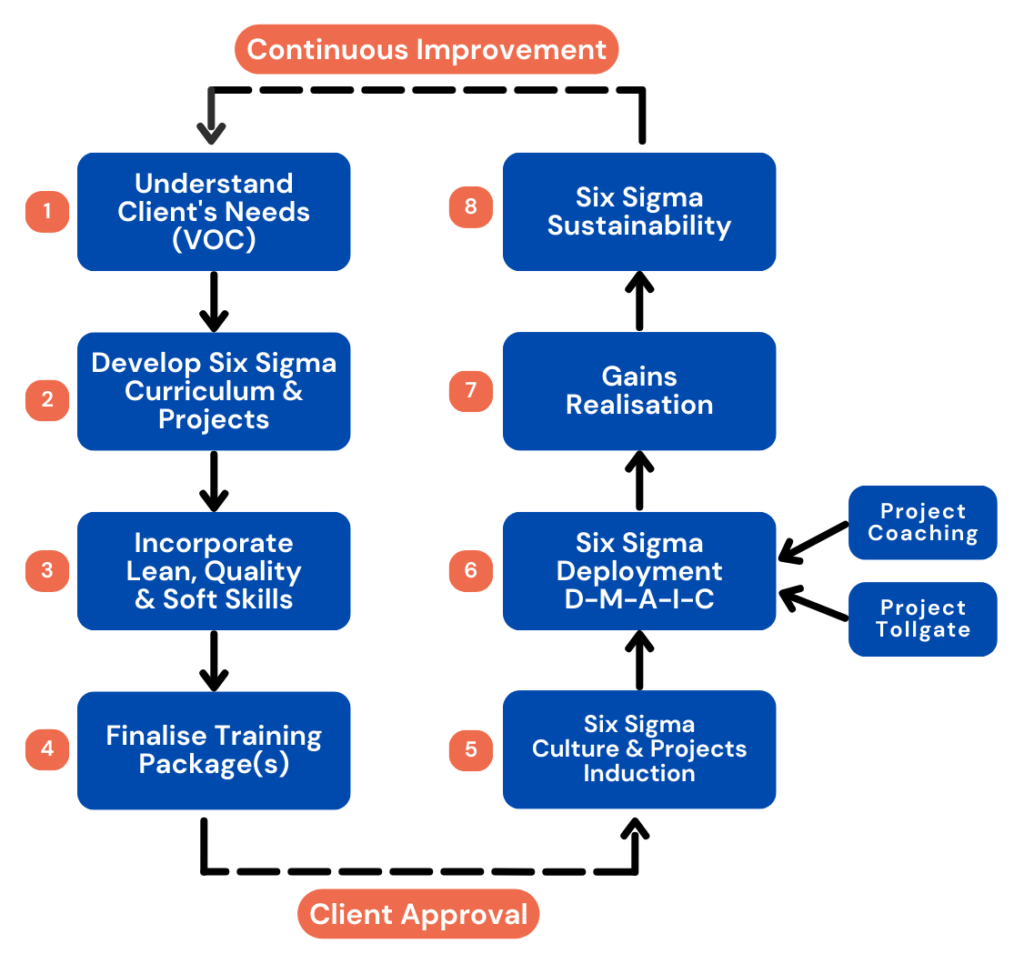Our Approach
Lean Six Sigma deployment methodology, backed by years of industry experience
Deployment Methodology: Lean Six Sigma

Lean Six Sigma consultants coaches the team understand Lean Six Sigma tools and methodologies and how to utilize them and deliver advice and assistance when it is truly desired or necessary
In the DMAIC Methodology, the Define Phase involves defining/summarising the problem and the objectives and determining the customers (internal & external) and their demands and expectations.
In the DMAIC Methodology, the Measure Phase aims to collect data that is relevant to the scope of the project. Focus on the ways the parameters need to be quantified and measured via different techniques and methods.
In the DMAIC Methodology, the Analyze Phase involves analyzing the process, the factors, and the influence of a business’ inefficiencies, and ways to enhance and improve them.
In the DMAIC Methodology, the Improve Phase aims to improve processes by identifying and implementing possible approaches to resolve and improve organizational issues
In the DMAIC Methodology, the Control Phase focuses on ensuring the improvements achieved are monitored and maintained
Project Audits involve Lean Six Sigma auditors conducting audits of the project to ensure that the improvements made during the improvement phase are sustained and standardized.

The process to gather and analyze customer feedback and requirements to identify areas for improvement.
The act to develop a structured curriculum and select improvement projects aligned with client needs.
The process to incorporate Lean principles, quality methodologies, and soft skills training into the curriculum.
The task to refine and formalize the training materials and resources.
Initiate training to instil a Six Sigma culture and introduce selected projects
Implement Six Sigma’s DMAIC methodology in the organization and deploy it into process management projects.
Monitor and measure the improvements achieved through Six Sigma projects.
Six Sigma Sustainability focuses on establishing practices and systems to ensure the long-term sustainability of Six Sigma principles.
Continuous improvement is achieved when the team continuously reviews and adapts the improvement process to drive ongoing enhancements and efficiency gains.
Project Coaching involves the consultants providing coaching, and support to the teams to ensure the success of the initiative with continued sustainability through the correct application of Lean Six Sigma methodology, processes, tools, and activities.
Project Tollgate in Lean Six Sigma project management is a checkpoint at each DMAIC phase in which the project leader, sponsors, and stakeholders meet to review the project’s progress at each phase’s completion.
Client Approval involves seeking the client's approval and alignment with the proposed training and improvement plan.

Trained business leaders who lead the deployment of Six Sigma in a significant business area.
Fully-trained quality leaders responsible for Six Sigma, training, mentoring, deployment and results
Fully-trained Six Sigma experts who lead improvement teams, work projects across the business and mentor Green Belts
Fully-trained individuals who apply Six Sigma skills to projects in their job areas.
Individuals who receive specific Six Sigma training and who support projects in their areas.
Individuals who have attended general Six Sigma awareness training.
